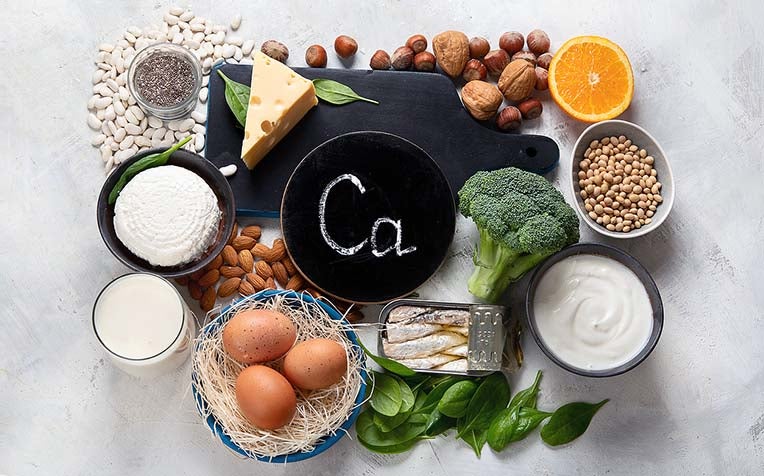
Calcium (Ca) is essential for strong bones. Fortunately, there are a wide array of food options (dairy and non-dairy) to choose from to easily include in your daily diet.
Dietitian Lee Hui Bing from the Department of Dietetics at Sengkang General Hospital (SKH), a member of the SingHealth group, shares foods and food tips that help build strong, healthy bones.
Top foods for strong bones
1) Include high-calcium foods in your meals
Calcium helps to ensure your muscles, blood vessels, nerves and cells work normally. If you do not get enough calcium in your diet, your body will take it out from your bones to keep the blood calcium level normal. That is why a diet high in calcium is important.
Below are good sources of calcium to start including in your meals today!

2) Can't take dairy? Go for soy or calcium-fortified foods
If you can’t consume dairy because of lactose intolerance or dietary preferences, look
for calcium fortified products and soy products with labels like “high calcium” or “calcium fortified”. Even if you are lactose intolerant, you can still take yoghurt or hard cheeses as these have lower lactose content compared to fresh milk.
3) Don't neglect vitamin D
Our digestive system does not absorb calcium well, so vitamin D helps the gut absorb more calcium. It also regulates bone renewal and development.
Foods that contatin vitamin D include:
Salmon,
Tuna,
Sardine,
Egg and cheese, and
Fortified cereals
However, the best source is still direct exposure to sunlight (at least 15 minutes a day) to stimulate vitamin D production in our skin.
4) Choose natural foods over supplements
The key to minimising bone loss is to have a healthy, balanced diet that meets all your body’s nutritional needs.
Natural calcium-rich foods are preferred sources of calcium as they provide a variety of nutrients such as protein and vitamin B12, which you won’t get from calcium supplements alone.
Misuse of supplements can also result in excessive intake of calcium or vitamin D (more than 4,000 international units per day) which could lead to health problems such as kidney stones and calcium deposits in the heart, lungs and blood vessels.
When choosing calcium supplements, you need to consider:
Type of supplement
Dosage
Possible side effects, and
Any potential interaction with medications you are taking
Do consult a dietitian or pharmacist for advice prior to taking any supplements.
5) Drink less alcohol
Chronic heavy drinking increases the risk of osteoporosis by killing osteoblasts, the bone-forming cells. Keep to one alcoholic drink for females and two for males daily. A standard drink is either 330ml regular beer, 100ml wine or 30ml hard liquor.
Osteoporosis in Singapore
Osteoporosis (or brittle bones) increases the risk of fractures, which can lead to longer hospitalisations, serious health problems, affects mobility and even disability.
In Singapore, hip fracture hospital admissions in 2020 have increased to 2,729 cases, compared to 1,487 in 2017. This number is projected to hit 9,000 by 2050 due to our ageing population.
Osteoporosis often progresses without symptoms or pain until a bone fracture occurs. Dr Donovan Tay, Senior Consultant in Endocrinology from the Department of General Medicine at SKH shares, "Up to 50% of patients with fractures didn't know they had osteoporosis prior to suffering an injury."
Post-menopausal women over the age of 65 and men above 70 are more likely to develop osteoporosis. Hence Dr Tay suggests osteoporosis screening for women above 65 and men above 70, or earlier at 50 if you are at greater risk.
Osteoporosis fracture facts that will shock you to your bones
"When you get an osteoporotic fracture (the medical term for an osteoporosis fracture), it can be life-changing. Your quality of life decreases and it affects your ability to do everyday things. Recovery also takes a long time; you'll be unable to work and have to worry about healthcare costs," explains Dr Colin Wang, Associate Consultant from the Department of Orthopaedic Surgery at SKH.
Here are some startling facts:
Globally, 1 in 3 adults above 65 years old suffers a fall.
26% of elderly patients who broke their hip die within one year.
2 in 3 adults aged 60 and above have 'fall phobia' (after a fall), which can lead to withdrawal from physical or social activities
Prolonged immobility and inactivity will increase social isolation and loneliness, risk of heart diseases, gradual muscle loss (sarcopenia) and rapid deconditioning which make the elderly even more prone to falling and sustaining fractures.
For spinal injuries, nerve damage may result and in worse cases, patients become permanently wheelchair-bound and need help with basic activities like eating, dressing or personal hygiene.
Even when nerve injuries do not occur, fractures can lead to permanent deformity, chronic pain and joint stiffness.
This article was adapted from Skoop magazine (issue 9).
Ref: J22
Check out other articles on bone health:
Osteoporosis: What Women Need to Know About Bone Health
Arthritis: What Is It and Types
Contributed by

















 Get it on Google Play
Get it on Google Play